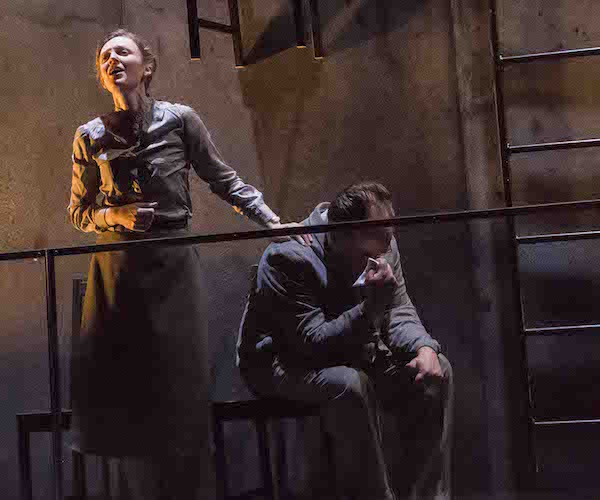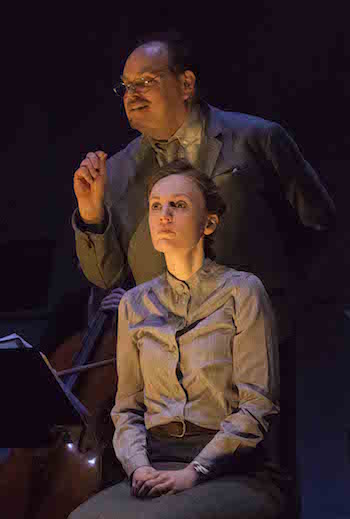Opera Review: “The Rosenbergs” — A Morally Complicated Tale, Well Told
The Rosenbergs is small in scope but large in ambition; it is an accomplished and moving work that demands attention.
The Rosenbergs (An Opera). Music by Joachim Holbek. Libretto by Rhea Leman. Directed by Dmitry Troyanovsky. Musical Direction by Cristi Catt. A North American premiere co-produced by Boston University and Brandeis University, presented by Boston Playwrights’ Theatre at the Boston Playwrights Theatre, Boston, MA through April 22.

Christie Lee Gibson (standing) and Brian Church (seated) in the Boston Playwrights’ Theatre production of “The Rosenbergs (An Opera).” Photo: Kalman Zabarsky.
By Steve Provizer
Danish composer Joachim Holbek wrote the music and American expatriate Rhea Leman the libretto for the opera The Rosenbergs. It’s odd that such a quintessential American story should be undertaken by foreign theater artists. But, in the end, I think a little bit of distance may have helped them pull off a difficult theatrical balancing act.
Full credit to the artistic team behind the current North American premiere of The Rosenbergs at the Boston Playwrights Theatre for thoroughly grasping the creators’ intent. They understand the emotional pitch and scope of the opera and successfully illuminate the difficult issues at play. In other words, this production gets it right. The set design is spot on. It’s creatively staged and lit. The acting is well calibrated; the music is beautifully performed.
There are only two characters: Ethel Rosenberg (Christie Lee Gibson) and Julius Rosenberg (Brian Church). Also present on the stage are pianist Nathan Urdangen, cellist Miriam Eckelhoefer, and violinist Abigale Reisman. Stylistically, the music might be characterized as 20th century modern with forays into mid-20th century Broadway — the repertoire called the Great American Songbook. The harmony is challenging, but tonal. Occasional physical ‘knocking’ on the bodies of the instruments widens the sonic palette, as do sections where the strings build tension through quiet harmonics and scratchier bow work. The trio performed this challenging score superbly.
Julius Rosenberg’s vocal part is generally in the baritone range, with occasional dips into bass and climbs into tenor. Church’s voice is resonant and clear and his articulation is excellent. Gibson’s Ethel Rosenberg is a soprano; the role calls for occasionally rising above the staff and down to mezzo range. Her voice is excellent throughout, perhaps slightly weaker when the part calls for moving even lower into the alto register. Both actors completely inhabit their parts. I never caught either losing focus — not simple when you are the opera.

Christie Lee Gibson and Brian Church in the Boston Playwrights’ Theatre production of “The Rosenbergs (An Opera).” Photo: Kalman Zabarsky.
The stage set needs to present dramatic action at a political rally and a Jewish ghetto as well as jails and courtrooms. It has an appropriately cage-like feeling along with a grey Stalinist chill. Movable chairs cleverly serve a variety of staging functions, as does a fire escape-type ladder attached to the back wall. The strangest feature of the set is that the floor is covered with what looks like black sand. The actors appear barefooted throughout the performance and sporadically pick up the sand or sift through it, as if their problems (or solutions) were buried in the darkness. At one point, Ethel discovers a buried toy airplane, which she flies around the room and then re-buries while singing “sleep tight, my babies,” a powerful evocation of the terrible loss of the couple’s two children.
This is no straightforward tale of spies who despised their country and sold it out. Julius and Ethel were deeply rooted in the social justice movements of the 1930’s; they were idealists who believed in the ethical mission of America and the duty to bring it to fruition. The Rosenbergs became Communists at a time when Russia was our ally; Communism was somewhat more culturally acceptable at the time. After World War II, this relationship changed dramatically and we entered into a cold war with Russia that has not yet ended. The Rosenbergs seem to have lagged well behind this realpolitik transformation; they retained their initial somewhat naïve utopian hopes, a ’30s belief in the value of working for international amity.
When the pair were caught up in the Communist-hunting that took hold in this country in the late ’40s-early ’50s, they became torn between family and their political philosophy. The idealism that brought them together had intertwined into their romantic life. They simply don’t know what to say to prosecutors. Should they admit they were spying and give up the names of fellow travelers? Should they plead the Fifth Amendment and assume that a lack of evidence would exonerate them? How much is their love for each other built on shared values? If they relinquish those, would their love — the reason for their initial attraction — die? Should they cling to abstract political values, even if it means the destruction of their family and the loss of their lives?
This is a morally complicated tale and the challenge in telling it is to find a way to illustrate those ambiguities in the context of a story filled with dense political and family narratives. The Rosenbergs successfully explores these themes and, while it clearly impugns the existence of the Communist witch hunt, the opera maintains aesthetic distance in judging the rightness or wrongness of the Rosenberg’s actions. This is an impressive dramatic achievement: to keep a convincing balance given the extremity of the ideas and passions: the venality and ignorance of the U.S. communist witch hunt, the dedication of the Rosenbergs to social justice, their semi-blindness to the seriousness of their plight, and the tragedy of a family rent asunder. Populated by just two actors and three musicians, The Rosenbergs is small in scope but large in ambition; it is an accomplished and moving work that demands attention.
Steve Provizer is a jazz brass player and vocalist, leads a band called Skylight and plays with the Leap of Faith Orchestra. He has a radio show Thursdays at 5 p.m. on WZBC, 90.3 FM and has been writing about jazz for many years. He also acts and is a member of SAG.
Tagged: Boston Playwrights Theatre, Cold-War, Joachim Holbek, Rhea Leman, Steve Provizer
